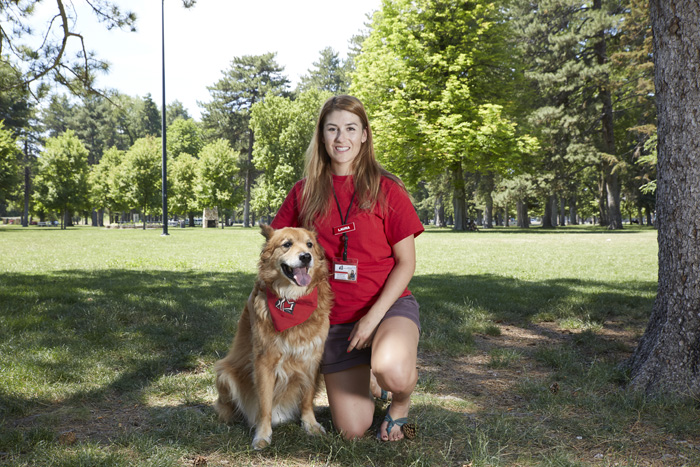
Almost half of Utah households own dogs, according to a 2013 study by the American Veterinary Medical Association, which means we know a lot of you readers have wondered at least once: Where can I get an official vest and badge so I can take my dog on a plane?
“Our administrative assistant gets at least one call a day about this,” says Karen Burns, Assistant Director & R.E.A.D. (Reading Education Assistance Dogs) Coordinator of the local nonprofit organization, Intermountain Therapy Animals (ITA). “We are glad people care about their pets and want to take them along, but we are adamant about being a professional training entity. These calls give us the opportunity to explain what we do.”
The use of animals to support people with physical and mental ailments is on the rise. What most people do not know, however, is that there are three different types of support animals with distinct jobs and mandatory certification processes. This lack of awareness has fostered a simultaneous increase in abuse of the support animal system through the use of fraudulent documents by owners who wish for their canine companions to gain admittance to places that do not allow pets.
The term support animal can refer to a service animal, a therapy animal, or an emotional support animal. Cats, rabbits, and even miniature horses are on the list of approved support animals, but the vast majority are canine. Covered by the ADA, service dogs are each specifically trained to assist one person and are permitted to accompany their owners into public establishments, as well as live with their owners, regardless of any “no pets” policies. “Service dogs undergo extensive behavioral training, and the outcome is an animal that is attentive to the owner’s needs and that can tune out other stimuli,” says ITA’s Executive Director Kathy Klotz.
With the main job of providing emotional support and comfort to many different people, therapy dogs are not covered by ADA and are not allowed into public places with “no pets” policies. Though they need to be excellent at basic “manners” (i.e., “sit,” “stay,” “leave it,” etc.), therapy dogs do not undergo behavioral training. “It really depends on the dog’s—and owner’s—personality whether he or she will be happy doing therapy work,” says Klotz. “Not every dog and owner are up for it.”
Similar to therapy dogs, emotional support dogs do not receive specialized training to perform their primary function: providing emotional support through companionship to their owners. However, like service dogs, they may live with their owners who have disabilities, despite any “no pets” policies in place. They are not ADA covered and are not allowed into public establishments with “no pets” policies.
Therapy dogs are widely thought to have the most difficult job out of all service animals. Klotz explains that this is because they have to be able to greet and positively interact with every person they see, and “that’s not 100% natural for a pack animal like dogs.” Unlike service and emotional support animals, whose jobs are focused solely on their owners, therapy animals volunteer with their owner-handlers to provide support to constituents of organizations approved by their certifying entities. The training that organizations like ITA provide is primarily for therapy dog owners and covers topics like identifying signs of stress in canines and protocols for individual versus group visits, among others.
While it is up to businesses, such as airlines, to set their own policies regarding support animals, it is time for them to include information and allowances specific to each type. It is especially important for employees to know how to enforce these policies, as well as what official certification documents look like. “People are so worried about potentially offending someone with a disability that they dare not even ask to see official documentation of a support animal, much less question it,” says Klotz. This is what pet owners cheating the system are counting on.
Luckily, there are ways to control this growing problem. Most important to Intermountain Therapy Animals is for business owners to feel empowered to ask questions. “If there is any doubt about documents provided by an owner, or if an owner and dog are badly behaved, please call us!” says Klotz. “We don’t want people and animals—whether they are legitimate ITA members or not—out there disrupting other people and businesses while claiming to be a part of our organization, in addition to providing people false information about therapy animals (e.g., that they are allowed in public spaces).
It is noteworthy that Intermountain Therapy Animals started the world’s first R.E.A.D. program, which uses therapy dogs, and remains the world’s standard on this program today. Therapy dogs and other certified support animals do important work in our community, and it’s important that they and their certifying organizations be treated with the respect they deserve,” says Klotz.





